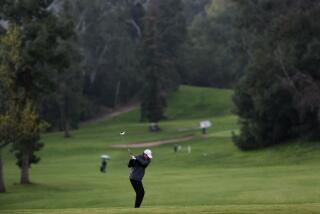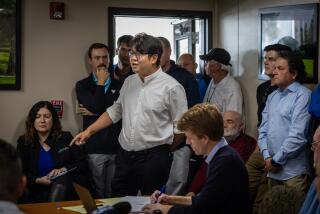In His Own Way, Greg Norman Also Is Making a Stand
- Share via
MELBOURNE, Australia — Greg Norman wheeled his car into the dusty driveway of the Huntingdale Golf Club, pointed to a spot just outside the front gate and said: “There. That’s where they’re supposed to be waiting for me.”
“Who?” his passenger asked.
“The anti-apartheid people.”
The people who want him to promise not to play golf in South Africa anymore. The people who want him to sign a pledge to that effect.
“And you won’t do it?”
“Hell, no,” Norman said. “They want me to sign a paper saying I won’t play in Sun City, in Bophuthatswana. Well, Sun City is a totally integrated place, and I’ve got a lot of friends there, black and white.”
Greg Norman is teed off.
The world’s No. 1-rated golfer is spending three weeks playing tournaments in the Melbourne area, not far from where he grew up, before rejoining the PGA Tour in the United States. He and David Graham, Australia’s two most successful professional golfers, were approached by Australia’s Anti-Apartheid Movement (AAAM), during a match-play event at Melbourne’s Kingston Heath golf course before this week’s Australian Masters.
The AAAM knew that both golfers’ names remained on a United Nations “blacklist” of more than 470 athletes, actors and entertainers who in recent years have performed in South Africa and have refused to sign a pledge to avoid further involvement with that country’s “racist regime,” as the U.N.’s Special Committee Against Apartheid describes it.
Norman and Graham both have played in Sun City’s $1-million challenge event, as has West Germany’s Bernhard Langer, England’s Nick Faldo and Wales’ Ian Woosnam, all of whom also are entered in the Masters this week at Huntingdale.
It was Norman, this country’s most successful and recognizable athlete, who became the focus of the Australian lobby’s latest protest after his angry words last week at Kingston Heath. “They want me to pledge that I won’t play golf in South Africa. Well, they can go to hell,” he said.
By the time he reached the Huntingdale driveway for the start of the Australian Masters, which he has won three times, Norman already knew that the AAAM was planning to picket against him, outside the gate. He expected some ugly words and, no doubt, a few signs alluding to his nickname, the Great White Shark.
Tournament officials were prepared. Police, disguised as spectators, followed Norman around the course during Thursday’s first round.
Norman, too, was prepared. “I’ve told my caddy, Steve Williams, to deck anyone who makes a move to get close to me,” he said.
No protest of any sort materialized on the first day, and the subject never even was broached with Norman in the many interviews he gave after the round. Later, there was speculation that the AAAM protesters planned to gather at the Huntingdale gates for the weekend’s two concluding rounds, hoping for larger crowds and more coverage from TV.
The AAAM has been busy elsewhere, reportedly convincing singer Dolly Parton to sign its pledge during her recent appearance in Sydney. Parton, who made the U.N.’s blacklist for appearing in Sun City in 1982, has been touring Australia with Kenny Rogers, and Norman attended their concert here Wednesday night.
An AAAM spokesman said a public demonstration was deemed necessary after Norman and Graham did not respond to any attempt to discuss the matter privately. James Erskine, the international manager of both golfers, was quoted by one Australian newspaper as saying: “I think the majority of top sports people around the world do not like mixing sport and politics. It’s hard not to be affected by some of the news pictures and footage you see coming out of South Africa, but I don’t think this is the best way of doing something about it.”
That’s how Norman felt, too, resenting blacklists and threats. “I’m a professional golfer and I’ll play wherever I choose,” he said.
He won’t find racial unrest only in Africa, though.
A few weeks from now, Norman and other pro golfers will be playing in another Masters, the one in Augusta, Ga., which is not all that far from Forsyth County, the spot 30 miles outside Atlanta where a massive rally recently was held to protest the fact that not one black has resided in the county for most of this century.
Coretta King, Joseph Lowery and other black leaders marched through the Cumming, Ga., streets, while fully robed Ku Klux Klansmen made their presence felt on the sidewalks.
Sometimes, protest is the only way to affect change.
One wonders, though, what would happen if athletes and entertainers were asked to pledge never to appear in Georgia until the entire state was fully integrated. And anyone who refused to sign was branded sympathetic to the racist regime.
Forsyth County is no Bophuthatswana, sure. But there are small scales of injustice and there are large scales of injustice, and a human being must choose if he or she will help tip these scales one way, or another way, or stay in the center and not tip them at all.
This is where Greg Norman happens to find himself standing.
More to Read
Go beyond the scoreboard
Get the latest on L.A.'s teams in the daily Sports Report newsletter.
You may occasionally receive promotional content from the Los Angeles Times.










